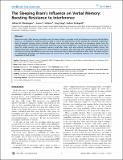The Sleeping Brain's Influence on Verbal Memory: Boosting Resistance to Interference

View/
Published Version
https://doi.org/10.1371/journal.pone.0004117Metadata
Show full item recordCitation
Ellenbogen, Jeffrey M., Justin C. Hulbert, Ying Jiang, and Robert Stickgold. 2009. The Sleeping Brain's Influence on Verbal Memory: Boosting Resistance to Interference. PLoS ONE 4(1): e4117.Abstract
Memories evolve. After learning something new, the brain initiates a complex set of post-learning processing that facilitates recall (i.e., consolidation). Evidence points to sleep as one of the determinants of that change. But whenever a behavioral study of episodic memory shows a benefit of sleep, critics assert that sleep only leads to a temporary shelter from the damaging effects of interference that would otherwise accrue during wakefulness. To evaluate the potentially active role of sleep for verbal memory, we compared memory recall after sleep, with and without interference before testing. We demonstrated that recall performance for verbal memory was greater after sleep than after wakefulness. And when using interference testing, that difference was even more pronounced. By introducing interference after sleep, this study confirms an experimental paradigm that demonstrates the active role of sleep in consolidating memory, and unmasks the large magnitude of that benefit.Other Sources
http://www.ncbi.nlm.nih.gov/pmc/articles/PMC2606059/pdf/Terms of Use
This article is made available under the terms and conditions applicable to Other Posted Material, as set forth at http://nrs.harvard.edu/urn-3:HUL.InstRepos:dash.current.terms-of-use#LAACitable link to this page
http://nrs.harvard.edu/urn-3:HUL.InstRepos:8231693
Collections
- HMS Scholarly Articles [17922]
Contact administrator regarding this item (to report mistakes or request changes)


